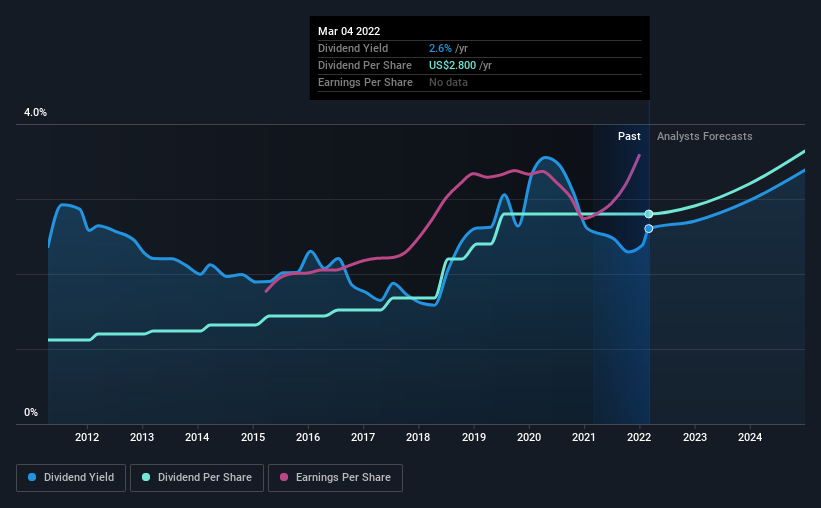There's A Lot To Like About Northern Trust's (NASDAQ:NTRS) Upcoming US$0.70 Dividend
Regular readers will know that we love our dividends at Simply Wall St, which is why it's exciting to see Northern Trust Corporation (NASDAQ:NTRS) is about to trade ex-dividend in the next four days. Typically, the ex-dividend date is one business day before the record date which is the date on which a company determines the shareholders eligible to receive a dividend. The ex-dividend date is of consequence because whenever a stock is bought or sold, the trade takes at least two business day to settle. Accordingly, Northern Trust investors that purchase the stock on or after the 10th of March will not receive the dividend, which will be paid on the 1st of April.
The company's next dividend payment will be US$0.70 per share, on the back of last year when the company paid a total of US$2.80 to shareholders. Calculating the last year's worth of payments shows that Northern Trust has a trailing yield of 2.6% on the current share price of $107.47. Dividends are an important source of income to many shareholders, but the health of the business is crucial to maintaining those dividends. That's why we should always check whether the dividend payments appear sustainable, and if the company is growing.
View our latest analysis for Northern Trust
Dividends are usually paid out of company profits, so if a company pays out more than it earned then its dividend is usually at greater risk of being cut. Northern Trust paid out a comfortable 39% of its profit last year.
Generally speaking, the lower a company's payout ratios, the more resilient its dividend usually is.
Click here to see the company's payout ratio, plus analyst estimates of its future dividends.
Have Earnings And Dividends Been Growing?
Businesses with strong growth prospects usually make the best dividend payers, because it's easier to grow dividends when earnings per share are improving. Investors love dividends, so if earnings fall and the dividend is reduced, expect a stock to be sold off heavily at the same time. For this reason, we're glad to see Northern Trust's earnings per share have risen 11% per annum over the last five years.
Many investors will assess a company's dividend performance by evaluating how much the dividend payments have changed over time. In the past 10 years, Northern Trust has increased its dividend at approximately 9.6% a year on average. We're glad to see dividends rising alongside earnings over a number of years, which may be a sign the company intends to share the growth with shareholders.
To Sum It Up
From a dividend perspective, should investors buy or avoid Northern Trust? When companies are growing rapidly and retaining a majority of the profits within the business, it's usually a sign that reinvesting earnings creates more value than paying dividends to shareholders. This is one of the most attractive investment combinations under this analysis, as it can create substantial value for investors over the long run. We think this is a pretty attractive combination, and would be interested in investigating Northern Trust more closely.
With that in mind, a critical part of thorough stock research is being aware of any risks that stock currently faces. For example - Northern Trust has 1 warning sign we think you should be aware of.
Generally, we wouldn't recommend just buying the first dividend stock you see. Here's a curated list of interesting stocks that are strong dividend payers.
Have feedback on this article? Concerned about the content? Get in touch with us directly. Alternatively, email editorial-team (at) simplywallst.com.
This article by Simply Wall St is general in nature. We provide commentary based on historical data and analyst forecasts only using an unbiased methodology and our articles are not intended to be financial advice. It does not constitute a recommendation to buy or sell any stock, and does not take account of your objectives, or your financial situation. We aim to bring you long-term focused analysis driven by fundamental data. Note that our analysis may not factor in the latest price-sensitive company announcements or qualitative material. Simply Wall St has no position in any stocks mentioned.

